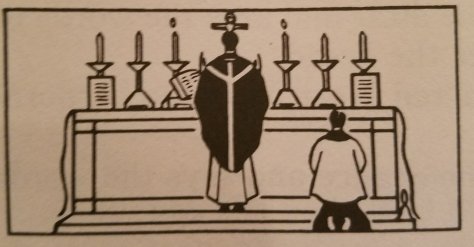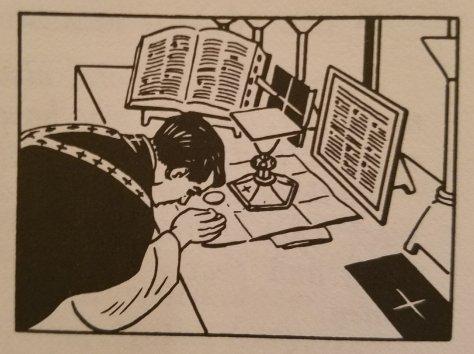
If ever we are meant to see Our Creator face to face in one beautiful moment of bliss for all eternity; is it not well to consider the statement we always hear that everything happens for a reason, our reason. I have heard this statement so many times in my life, but does one ever really stop and contemplate the power and practicality behind those words?
In order to fully understand the meaning of this statement, we must first realize the reality of coming from such an omnipotent and infinite Designer. Since we are created from the ashes of the Earth, but live in a world of constant change and development; no matter how much of a pedestal mankind would like to elevate itself to, we are still subject to an inevitable change. Unfortunately the separatism that mankind undergoes in attempting to isolate itself from it’s Creator is nigh impossible to achieve, but is seemingly most always the goal of the societies we live in. As well, most people do not understand that created matter is in fact the lowest form of reality, that our senses deceive us in this life and that everything that seems important to devote our time and lives to is in fact not when compared to eternity.
“As a father hath compassion on his children, so hath the Lord compassion on them that fear him; for he knoweth our frame, he remembereth that we are dust.” (Ps. 102: 13-14).
“Can a woman, forget her infant, so as not to have pity on the son of her womb? And if she should forget, yet will not I forget thee. Behold, I have graven thee in my hands; thy walls are always before my eyes.” (Is. 49:15-16)
One may consider the accomplishments mankind has achieved when it comes to the extent of space travel, as compared to the vastness and stretches of space itself. Apollo 13 currently holds the Guinness world record for the farthest travel by mankind in space at 248,655 miles away from the Earth. The Voyager satellite has since now, entered interstellar space and is still venturing forth. But what of those accomplishments compares to the vastness and openness of the space in which we occupy? Hardly any comparison if one takes the zoomed out perspective and sees the inifinte universe in its entirety.
Down at a molecular level, things are happening within us everyday that we are unaware of. White cells are fighting off infections and intruders to the body constantly. Billions of male sperm enter into the female body and fight through obstacle after obstacle; finally releasing it’s tail to enter into the female egg when but one sperm out of billions is left to lay claim to it’s long awaited destination. Automatically knowing what to do, when to do it, and not being given any direction by us as human beings.
The only thing we do have control over is our free will to choose the good things in life and our intellect to know what is TRULY good and what is only apparently good. This Earth as I have stated before is our Garden of Eden. This Earth is mankind’s workshop to achieve the designed end to which we are all subject. There is no middle ground, and we know this because this is what God in the person of Jesus Christ has come to tell us through His Church, and through His Apostles, and Disciples. Knowing that there is no middle ground, one must make a conscience decision everyday in every thought, word, or action to consecrate themselves to God and His Divine Providence for us or to work against it.

How do I know what God’s plan for me is? In order to answer this question, we should start with the best but probably most overlooked example of how we should be living our lives, it is the example of our first parents Adam and Eve. Many exclaim that such stories are only myths and often times distort their relevance when it comes to how it applies in their own lives. Regardless of the details the message is extremely simple and one worth considering everyday. That message is that when Adam and Eve cooperated with everything that God gave them they were happy and in constant contact with Him. It is when THEY chose to hide from Him and when THEY chose to disobey His command that life for them got a little bit harder. And by harder I mean that they were cast out of the Garden and that death, diseases, and sickness are now upon us all as a result.
Getting back to the infinite Majesty of God, is it not possible to think that whatever choices we make, who ever we are surrounded with, and whatever we are doing; that God is speaking to us through all these things. I do not mean that in a general sense, but that the events and happenings in our lives happen, as a result of the direction and guidance we need from God and His bottomless knowledge of His created beings.
“Behold the birds of the air, for they neither sow, nor do they reap, nor gather into barns: and your heavenly Father feedeth them. Are not you of much more value than they?” Matthew 6:26
It is said that not one hair falls from our heads without Our Lords consent. That makes everyday a test, a journey, the surrounding events in our lives are a result of how well we are doing, whetherour circumstances are TRULY or only apparently good. If we live in the reality that we all are meant for God then truly good things do and are happening to you, and not just apparently good things.
The things and circumstances placed before us in our lives are a direct reflection of the Love we do or do not have for God. Much as a Gardner who prunes a plant to bear good fruit, God knows what’s best for each and every one of us. We do not, because we do not do a well enough job of governing our senses with out His Graces. If we deny His Graces and live life according to the flesh, then we will die according to the flesh. Everything we need to know about how a person lived can be discovered from the manner in which they died. Whether or not someone has run out of favor or chances to use God’s graces to do His Will and be truly happy even in this life. And we know that the sins of one affect all, as a stone thrown into a still morning lake creates an unending ripple affect.
My grandfather was raised Catholic. During my youth I watched as he attended Church every Sunday with His wife, who taught Catechism to the students. Both of them prayed the rosary with all 8 of their grandkids whenever we were there and there was barely a moment I saw my grandfather without a rosary or Catholic book in his hands. Both my grandparents were extremely devout, and when they noticed the changes of Vatican 2 taking place in the Church, turning it from the only sacrifice acceptable and pleasing to God the Father into another Protestant service, they got up and walked out and did not go to mass until they found a parish that celebrated the Tridentine Mass the was codified at the council of Trent (St. Athanasius in Vienna Va), and did not recognize the heretical hierarchy of the new Novus Ordo religion.
I grew up praying the mass in the basement of a house, we prayed the Novena to St. Joseph to obtain a bigger church, a school, and more priests. Everything we prayed for we eventually received. By the time my grandfather was nearing his death, he completely tuned himself out from the rest of the world, received last rights from our priests several times (as he had several close calls), the final time being in the hospital, he was being given the Apostolic Blessing and died halfway through, on Christmas Day. At this point we now had 3 priests in our parish, his dying wish was to have a high mass said with 3 priests which was accomplished without a hitch. As well, his final resting place (next to his wife in Buffalo, who also died several years prior to him, painlessly in a stroke induced coma); was being pounded by a severe snowstorm as my parents escorted his casket to the Chapel up north. My dad stated that when they got there, the Church was beyond any beauty they had seen in person as well there was an air infantry unit (as my grandfather was a WW2 Veteran), ready and waiting to give him one of the most solemn and reverent burials my parents had ever seen.
The following week I discussed these events with my father wondering in amazement how he was able to coordinate everything and deal with a snowstorm that shut down roads and get everything accomplished. He stated to me that it just happened, everything fell into place without having to do anything. The first thing that came to my mind, was the testament to how this man, my grandfather, lived and devoted his life to God. That God was doing, for him, what he could not do for himself, because my grandfather had devoted his life to the service of His Creator.
When my grandmother passed, my mother was able to find and give me her rosary. At that point in my life I was in the throws of addiction. I had children out of wedlock (contrary to how I was raised), I drank everytime I could find money, I was addicted to pain pills and anything I could get my hands on. Anything to fill the void, and it was bad. I was consistently getting my girlfriend pregnant, we were constantly having utilities shut off because I was blowing money left and right, and my poor son and daughter had to deal with their parents screaming and fighting.
I began to pray every decade of the rosary as much as time would allow, every single day. I started going back to Alchoholics Anonymous, I got a sponsor, I started working the steps. I was able to get a year of sobriety down one day at a time. Sometimes one Hail Mary at a time. And then I kept going, and prayed for more. I prayed to get out of the volatile situation, I prayed for His Will, for the eyes of my significant other to be opened to the changes I had been attempting to make, as 5 years of Hell living with an addict and being pregnant back to back 4 times started to boil over in my first year of attempting to get sober.
I leaned extremely hard on Our Blessed Mother, the saints, and God. As soon as I got a year of sobriety our lease was up and if I continued to stay something bad would happen. We were on the verge of literally ripping each other’s heads off in front of our children. I found a room for rent after many nights sleeping in my truck or at my sponsors house and I left.
Three months later we were engaged, God has done for us what we could not do for ourselves. I have never been happier, because we separated, I made Holy Communion for the first time in 6 years. I have become an example that my kids do not run away from, my fiance loves, and my co-workers come to for advice and help. When we do right and live right God works His miracles through us! I only seek His Will for me everyday and I practically do not have to do anything but reap the rewards. I have had amazing moments of clarity and gratitude where I broke down crying. Not being financially well off, I had a wedding ring fall into my lap and the cross I thought I was to be cursed with carrying my whole life become another reason for me to live and to love.
We only have to live right and do right and have the Faith (see the blog post “In a Nutshell”), and He will meet us halfway. All we have to do is pray, hope, and don’t worry. That small inner voice that you hear everyday will guide you. You can become an instrument for His use in affecting day to day miracles and changes in others. We are all destined to be Saints! It does not matter where you come from, what you believe or don’t believe, everyone’s final end is God. The less we put ourselves, and our sensual desires for fleeting worldly things in between us and Him the more manifest the miracles become. Don’t believe me? Try listening to that small inner voice, the one that is constantly telling you to seek the Truth in all things. LOOK FOR THE TRUTH, not the apparent truth. You do not need to be rich if you have His Graces, and love conquers all. Look to the cross, and bear yours with patience. If Christ as God, had to suffer so much to prove His love for men, what will we have to suffer to prove our love for Him? Contrary to what most believe we actually have to work in order to obtain salvation. What’s the point of being born to just put your feet up, and not do anything? Where is the reward in that? Are not the Saints who are literally numbered in the millions all over the world, and in all times of our existence not the examples we need to follow to be like unto Christ? A life of hard and fruitful labor, with the mindset of laying up our treasure in Heaven that neither moth nor rust consumes, nor thieves break in and steal will pay off in this life AND for eternity. Do not stop drawing souls to Him and Truth until He says it’s time!
God Bless BJS!!












